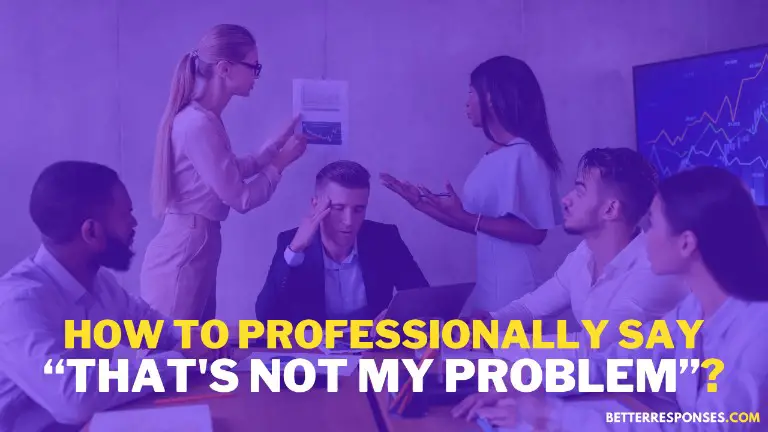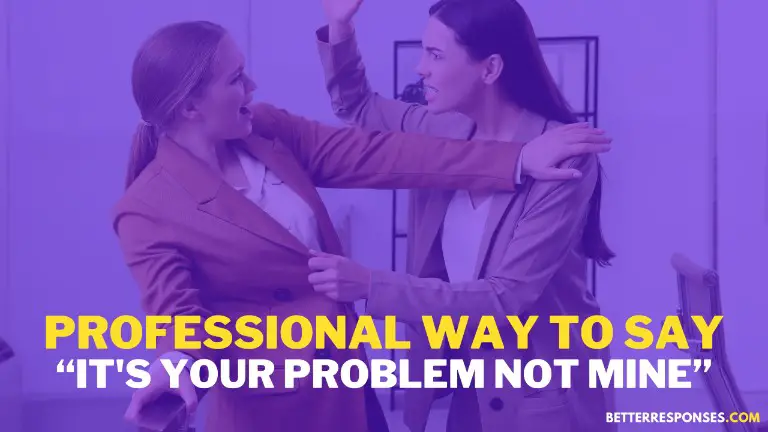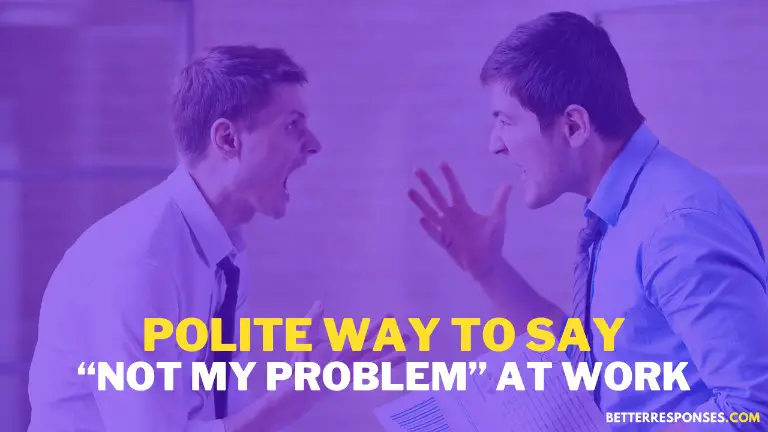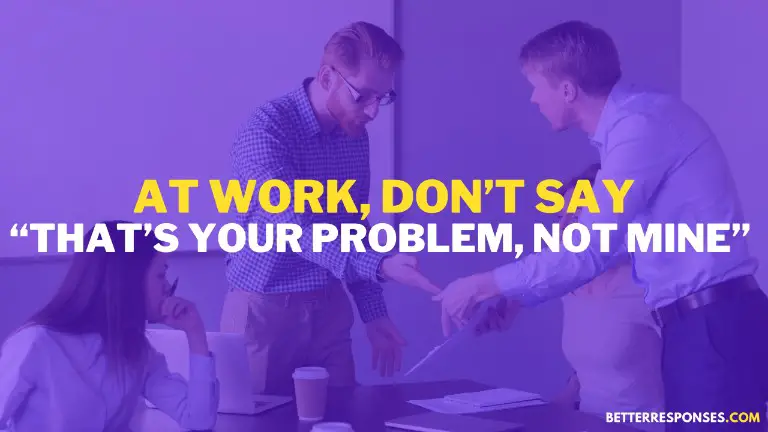Last Updated on January 26, 2024 by Ketan
You have the best reason to say “That’s not my problem (But, It’s yours)” clearly.
But, you know this is so unprofessional and rude to say at work.
It’s good if you avoid this phrase to keep professionalism.
It expresses your care to maintain a sound work connection.
Well, there are some conditions when you have to say it, though.
In this article, we are suggesting some polite and professional ways to say that this is their problem and not yours.
Either this is for your client, customer, or coworker.
How To Professionally Say “That’s Not My Problem”?
While making the deal you clearly stated what you guarantee and what not.
But a client might have ignored your information completely, and now expect your help.
Your colleague approaches you for some issue which they (create and) are responsible for but pitches as it is your role to fix that.
It’s their responsibility and maybe they are looking for someone to pass the blame.

In both cases, someone is looking for the solution to a problem that you can’t help or you don’t want to be part of.
Clearly, it’s them who should take the responsibility, as it’s their problem and not yours.
You can say it clearly, but that’s not appropriate for a professional setting.
If you are in a situation where you have to say it, here are some formal ways to say “That’s not my problem, it’s yours’ to a (careless) client or colleague.
1. “You’ve been handling it from the start and I don’t know what I can do for you here.”
If you can’t help or you don’t want to help this irresponsible coworker, you can say this.
It’s them who should take responsibility here and fix it.
READ NEXT: Sample Answers To ‘What Do You Like Most About Your Job?’”
2. “You need someone’s help here. But I’m not the right person for this.”
When a colleague approaches with some problem on hand.
By analyzing, you realize that it’s beyond your reach.
So you can at least advise them to speak to your team leader or manager for the right solution.
3. “In this case, only our team leader can help, not me.”
There’s a chance if you do anything here, you will be part of this blunder, too.
You want to avoid any drama at work.
So, you direct them to someone who they are reported to ultimately.
4. “Honestly, I don’t know anything about it.”
Because you don’t know anything about this task, you have no solution to offer.
This is a simple and formal way to say ‘That’s your problem’.
5. “It’s such a big issue now, sorry to say but I don’t want to be part of this.”
Here you ignore doing anything, this clearly shows that that’s a serious issue now.
Your coworker or teammate has made a huge mistake here.
So, they have to take responsibility and try to fix it by themselves here.

6. “If you asked me earlier, I could help, but right now I can’t. Sorry.”
This problem is getting bigger now.
And, now that’s risky to be part of any of this matter.
You tell them that you could help them if the issue was in the primary stage.
But now it’s beyond what you can do or for to do anything.
7. “I helped you with the best I can do, nothing more.”
What you can do you did your best and there’s not more you can offer.
From then on, it’s their matter and they should do something.
8. “I think I have warned you about it.”
A client contacts you with some problem, and they want you to fix it anyhow.
You have guided them properly and made them aware of the consequences.
If they have ignored it, it’s their concern and not yours.
READ NEXT: Polite Ways To Tell A Coworker To ‘Back Off’
9. “I don’t have access to it. Why don’t you approach our boss for this?’
This problem is something that is serious and beyond your role.
Better if you don’t be part of this.
So, you suggest them ask the boss for a solution, to avoid any involvement.
10. “I’m not responsible for this task, you do.”
Instead of saying “That’s your problem’ you can add ‘responsible’ here.
That makes more sense to inform a coworker to take their role seriously.
You don’t pass the blame but talk right here.
11. “I wish I could help but our boss specifically gave you this task. And there’s some reason for it.”
To a coworker who is always excusing and never doing their job, you can say this.
Your boss has given them some tasks and this coworker asks you to do them for them.
Which isn’t right and good for them.
So you politely tell them that “It’s your problem” and they should take it as a challenge.

12. “I can’t help you but I can share your issue with someone who could.”
No matter what, saying ‘That’s your problem’ to a client or customer is not a good idea at all.
So, it is better if you share this problem with someone who can resolve it when you can’t do it yourself.
READ NEXT: Example Answers To ‘Do You Have Any Questions For Me?’ In Interview
13. “In this case, not only me but no one of us here can help. You need to contact our service center.”
There is a customer care center for handling such issues from customers.
Being a sales representative when your client or customer approaches you to fix a problem, you can say it politely.
You don’t want your customer to feel helpless, by saying ‘That’s not my problem’.
14. “That’s quite bad to hear that, but I can’t help you in this case.”
You, of course, want to help your coworker.
But this is something that you should avoid because that’s their problem and not yours.
Still, you can wish them good luck here.
15. “That’s kind of a serious problem you have here. I’m afraid I can’t help.”
You know the kind of problem they created.
Even if you want, you feel that it’s so risky to do anything for them.
16. “It would be good if you learn something yourself and do what you should do as part of your job.”
This is a formal response to a coworker who always excuses others for their problems.
You have experienced it earlier.
So, now you tell them to fix it themselves and maybe be more responsible for their work.
READ NEXT: What To Say When Boss Says ‘Thanks’ To You?
Don’t Say “That’s Your Problem, Not Mine” At Work
Saying “That’s not my problem, it’s yours” is totally rude to anyone.
This shows you have no concern for someone’s problem.
Even if you are dealing with a client or coworker who is responsible for such a mistake, it’s better if you avoid saying this at all.

When your coworker comes to you after they messed up at work, and if you do anything you become part of it.
So you want to stay away from such situations.
Same with clients who completely disregard your policies, and suggestions and make a mistake.
Now they are hoping you will fix something for them.
These both cases state that ‘It’s not your problem’, it’s them who are responsible for it.
To stay away from being involved in it, or if you want them to learn a lesson here, you have the right to say “That’s not my problem, (but yours)”.
But you should avoid that.
Instead of being a mean and unprofessional, you can remain polite and professional.
When a customer behaves irresponsibly or a colleague makes excuses for something, you say “That’s not my problem” professionally, to make them aware of their important thing.
- 16 Better Replies To “We Should Talk More” - July 24, 2024
- 134 (Witty &) Flirty Answers To “Why Do You Love Me?” - July 24, 2024
- 27 Best Responses To “How Was Your Day?” - June 11, 2025


